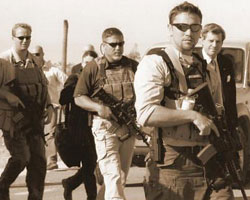 Yesterday, Richard J. Griffin, head of the State Department’s Bureau of Diplomatic Security, became the first senior official to lose his job over Blackwater’s September 16 shooting in Baghdad’s Nisour Square. As head of State’s law enforcement arm, Griffin, a former deputy director of the Secret Service, was charged with overseeing security for diplomats and dignitaries. In Iraq, where much of this function has been outsourced to private military contractors, this amounted to providing oversight of the more than 1,000 armed security operators attached to firms such as Blackwater, Triple Canopy, and DynCorp. Until recently, according to the Washington Post, these private contractors have been supervised by a mere 36 diplomatic security agents. A review panel convened to examine the State Department’s security practices in Iraq, whose conclusions were released on Tuesday, found “there are an insufficient number of Diplomatic Security Service Special Agents assigned to the Embassy to provide the appropriate level of oversight to ensure adherence to the rules and procedures currently in place.” The report also determined that “the licensing process for PSD contractors, both as to fees and procedures, is insufficiently clear and expeditious, increasing the risk that armed contractors will carry out their functions with an inadequate legal basis.” As we speak, Secretary of State Condoleezza Rice is seated in 2154 Rayburn, preparing to testify before Henry Waxman’s Committee on Oversight and Government Reform, where she will no doubt face some tough questions about her agency’s performance in Iraq and its oversight of PMCs.
Yesterday, Richard J. Griffin, head of the State Department’s Bureau of Diplomatic Security, became the first senior official to lose his job over Blackwater’s September 16 shooting in Baghdad’s Nisour Square. As head of State’s law enforcement arm, Griffin, a former deputy director of the Secret Service, was charged with overseeing security for diplomats and dignitaries. In Iraq, where much of this function has been outsourced to private military contractors, this amounted to providing oversight of the more than 1,000 armed security operators attached to firms such as Blackwater, Triple Canopy, and DynCorp. Until recently, according to the Washington Post, these private contractors have been supervised by a mere 36 diplomatic security agents. A review panel convened to examine the State Department’s security practices in Iraq, whose conclusions were released on Tuesday, found “there are an insufficient number of Diplomatic Security Service Special Agents assigned to the Embassy to provide the appropriate level of oversight to ensure adherence to the rules and procedures currently in place.” The report also determined that “the licensing process for PSD contractors, both as to fees and procedures, is insufficiently clear and expeditious, increasing the risk that armed contractors will carry out their functions with an inadequate legal basis.” As we speak, Secretary of State Condoleezza Rice is seated in 2154 Rayburn, preparing to testify before Henry Waxman’s Committee on Oversight and Government Reform, where she will no doubt face some tough questions about her agency’s performance in Iraq and its oversight of PMCs.
Update: Well, Rice is indeed facing tough questions at the Waxman hearing. She’s just not answering them.


















